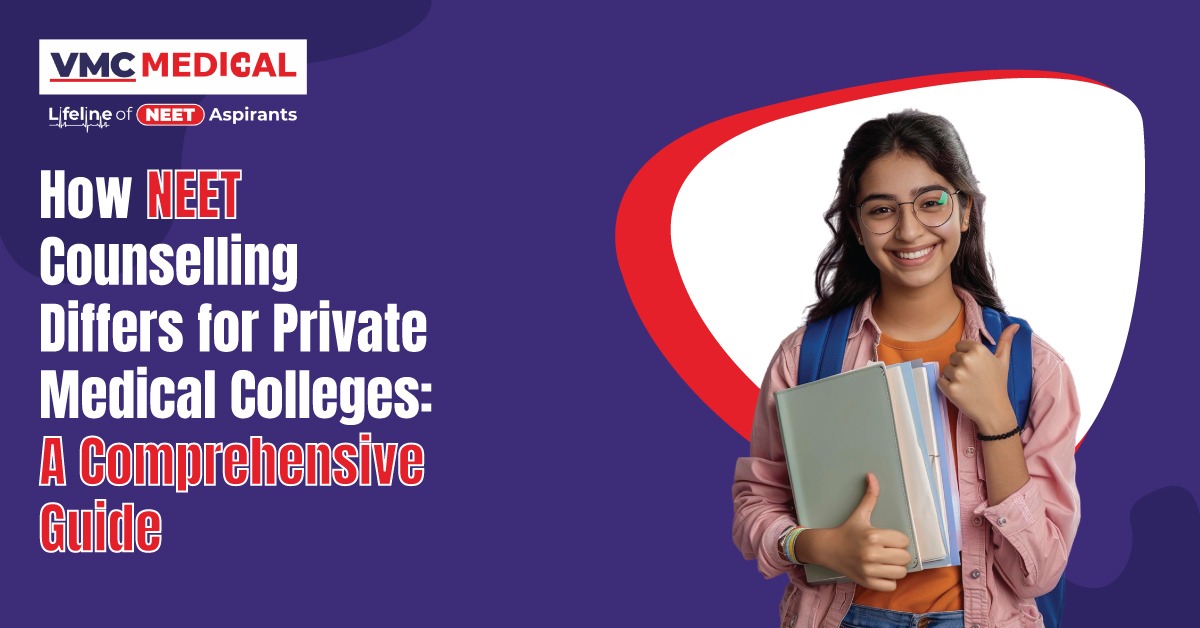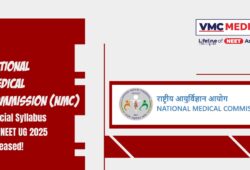How NEET Counselling Differs for Private Medical Colleges: A Comprehensive Guide
 Posted On
Posted On
120 total views, 1 views today
The National Eligibility cum Entrance Test (NEET) is the gateway for aspiring medical students in India to gain admission to undergraduate medical courses, such as MBBS and BDS, in government and private colleges. While the NEET examination is uniform for all candidates, the counselling process differs significantly for government and private institutions, particularly with respect to seat allotments and admission criteria. This blog will focus on the key differences in NEET counselling for private medical colleges, with a special emphasis on seat quotas like the management quota, NRI quota, and state quota.
1. Overview of NEET Counselling for Medical Colleges
NEET counselling is the centralized process conducted for the allotment of seats to medical students based on their NEET scores. For government medical colleges, the Medical Counselling Committee (MCC) manages the All India Quota (AIQ) seats, which comprise 15% of the total seats. However, when it comes to private medical colleges, the seat allocation process is a little more complex due to the different categories of seats available.
Private medical colleges offer the following types of seats:
- State Quota Seats
- Management Quota Seats
- NRI Quota Seats
Each of these categories has its own counselling process, eligibility criteria, and fee structure, which differs significantly from the government medical colleges.
2. Types of Seats in Private Medical Colleges
a. State Quota Seats
State quota seats are available for students who belong to the respective state where the private medical college is located. These seats are often filled based on the NEET scores of students who have domicile status in that particular state.
- Eligibility: Candidates must have the domicile of the state.
- Counselling Authority: The state government conducts the counselling process for these seats.
- Seat Reservation: State quotas often follow a reservation policy based on caste categories, such as SC/ST/OBC.
For instance, if a student is from Karnataka, they can apply for state quota seats in private medical colleges in Karnataka through the state-level counselling process. This provides students with an opportunity to secure seats at a lower tuition fee compared to management or NRI quotas.
b. Management Quota Seats
Management quota seats are a unique feature of private medical colleges. These seats are not under the purview of government regulations, and the fees for these seats are typically much higher than the state quota seats.
- Eligibility: Any NEET-qualified candidate, irrespective of domicile, can apply.
- Counselling Authority: The private colleges themselves or the state government may conduct separate rounds of counselling.
- Fee Structure: The fee for management quota seats is significantly higher, making them accessible to students who may not have secured top ranks but are willing to pay the required fee.
Management quota seats are often in high demand as they provide a second chance for students who may have missed out on state quota seats due to lower NEET scores.
c. NRI Quota Seats
NRI quota seats are reserved for Non-Resident Indians (NRIs) and Overseas Citizens of India (OCI). These seats are specially designated for students who fall under the NRI category and have completed their education outside India.
- Eligibility: Students must be NRIs, OCIs, or have NRI sponsorship.
- Counselling Authority: The counselling for NRI quota seats is typically handled by the respective colleges or state counselling bodies.
- Fee Structure: NRI quota seats come with the highest fee structure, often ranging in lakhs or even crores, depending on the institution.
The NRI quota allows students from abroad to pursue medical education in India without competing directly for state or all-India quota seats.
3. Navigating the Counselling Journey for Private Medical Institutions
The counselling process for private medical colleges is usually conducted at the state level, separate from the MCC’s All India Quota counselling.
a. State-Level Counselling
State authorities conduct the counselling for state quota, management quota, and NRI quota seats in private medical colleges. Each state has its own rules, and students need to register separately with the state counselling body to be considered for these seats.
For example, Tamil Nadu, Maharashtra, and Karnataka each have their own state medical councils that manage the counselling process for private medical colleges in their respective states.
- Registration: Students need to register on the state’s official counselling portal by submitting the necessary documents and paying a registration fee.
- Merit List: After registration, a state-wise merit list is prepared based on the NEET score, and students are invited for counselling rounds.
- Choice Filling and Seat Allotment: Similar to the AIQ process, students have to fill their choices for colleges and courses. The allotment is based on the NEET rank, the availability of seats, and the candidate’s preferences.
- Document Verification and Fee Payment: After seat allotment, candidates must verify their documents and pay the prescribed fee to secure their admission.
b. Institutional Counselling
Some private medical colleges conduct their own counselling process for management and NRI quota seats. In this case, students apply directly to the institution by filling out an application form and attending the counselling at the college premises.
- Direct Application: Students interested in management or NRI quota seats often apply directly to the college.
- Interviews and Discussions: In some cases, the college may conduct interviews or discussions as part of their seat allocation process, although the NEET score remains the primary eligibility criterion.
- Fee Negotiation: While not common, some colleges allow for fee negotiations or installments for students securing management or NRI seats.
4. Key Differences Between Counselling for Government and Private Medical Colleges
The counselling process for private medical colleges differs from that of government institutions in several ways:
- Multiple Quotas: Private colleges offer state, management, and NRI quota seats, unlike government colleges which mainly have state and all-India quotas.
- Higher Fees: The tuition fees for management and NRI quota seats are significantly higher than those in government institutions.
- Separate Counselling Authorities: While the MCC handles the AIQ for government seats, private college seats are managed by state authorities or the respective institutions.
- No Domicile Requirement for Management Quota: Unlike state quota seats, management quota seats in private medical colleges are open to students from any part of India.
5. Challenges and Considerations for Students
While private medical colleges provide alternative options for students, there are several challenges and considerations to keep in mind:
- Higher Costs: The tuition fees for management and NRI quota seats can be prohibitively high, making it important for families to plan their finances accordingly.
- Counselling Confusion: With multiple rounds of counselling being conducted by different authorities, students may find the process confusing and difficult to navigate.
- Transparency Issues: Some students and parents have raised concerns about the lack of transparency in the management and NRI quota admissions, with complaints of backdoor entries and donation-based seats.
Closing Thoughts
NEET counselling for private medical colleges is a complex yet crucial part of medical admissions in India. With multiple seat categories such as state quota, management quota, and NRI quota, students have several pathways to secure a seat in a private medical institution. However, the process requires a thorough understanding of the various quotas, eligibility criteria, and financial commitments involved. By staying informed and following the state or institutional counselling guidelines, students can enhance their chances of securing a seat in a reputable private medical college.



